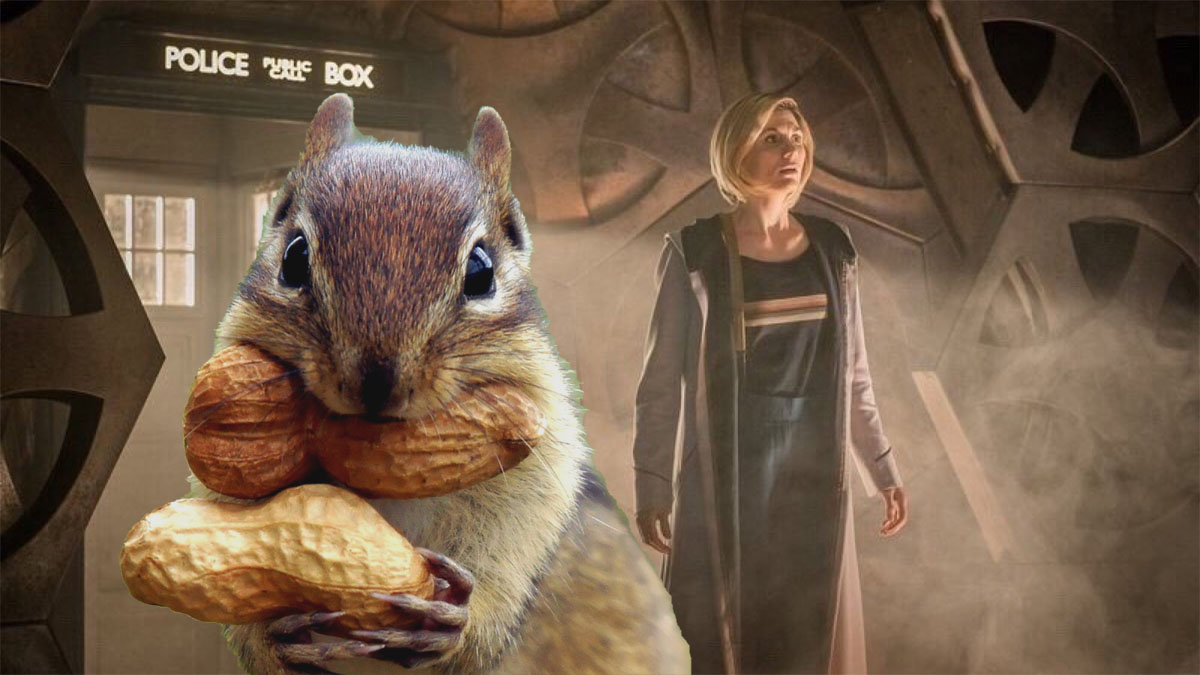Doctor Who series 11: Kerblam! review
Corporate intrigue, HR violations and more than a whiff of allegory? It’s all part and parcel in this episode of Doctor Who. Spoilers...
This section of the review is free of spoilers. If you venture below Daphne the spoiler-squirrel, beware…
11.7 Kerblam!
Here in the spoiler-free seats, there are times when it’s hard to know how much you can really say. Is it safe, even, to assume that people stuck around for the ‘Next Time’ trailer before diving back into their labyrinth of reinforced underground tunnels? To play it safe, let’s first address those viewers who lack so much as an inkling of what this episode might be about and have no preconceptions whatsoever:
It was good. In fact, if you’ve been feeling a little un-catered to so far this year and are a fan of unreasonably pejorative language, you might even consider it to be RUDDY good.
Why? Well, after half-a-dozen episodes setting out Series Eleven’s fresh approach to the Doctor and her companions, writer Pete McTighe offers up an instalment that feels rather more old-school and takes the stabilisers – bike ones, not dimensional ones – off at long last. Crucially, though, this doesn’t happen at the expense of the relatability and character work that have characterised this season. All of the laudable aspects are still in place, but it’s all a bit… snappier, more complex, with an increased density of ideas and more balls being juggled at once.
Considered as a stand-alone tale, it’s a fun and engaging piece of telly, even if it’s unlikely to end up breaching anyone’s all-time Top Ten list. The supporting cast turn out solid performances, though it’s really only Lee Mack who gets the chance to truly carve a niche for himself, and the sets are as sumptuous as ever. What makes ‘Kerblam!’ distinctive as part of Chris Chibnall’s debut year is that the central mystery is given a lot more time to mature than usual, permitted to twist itself this way and that before the veil is lifted and the pieces fall into place. If you’ve been lamenting this season’s simplistic plotlines, this might well be a breath of fresh air. Even better, if you’ve been enjoying Whittaker’s tenure, you’re unlikely to be disappointed – nothing has been lost just because the pace has picked up.
If you haven’t watched yet, Daphne bids you make haste…

It’s sometimes difficult to know when a show is deliberately throwing in references to a bygone age for the purposes of getting the audience back on-side and when it’s just dumb luck. ‘Kerblam!’ is… well, there isn’t a word for “old-skool Nu-Who”, and it’s doubtful the English language could survive one, but there’s a distinctly 2007-era vibe to this story. A ‘Planet of the Ood’, perhaps, or ‘The Crimson Horror’ if you’re looking further ahead down the Doctor Who timeline. There’s a touch of Big Finish Eighth Doctor about the whole affair, too, particularly the way The Teammate robots have such a made-for-audio voice.
Whatever its inspirations, from the minute the Doctor dons a Fez apparently purchased two regenerations ago and asks “Is this still me?” you get the sense that this episode is going to be a little more accepting of all that has gone before. Yes, it’s possible to grumble that a robotic postman was able to materialise inside a time capsule in flight, even when the Doctor spent a good ten minutes informing runaway bride Donna Noble that such things were impossible. It’s hard to care too much, though; not when everything’s racing along at ten-to-the-dozen to lure Team TARDIS to a gargantuan warehouse where someone, somewhere, is sending a distress signal.
Heavy-handed? Uncompromising? On the nose? Brutally honest? There are a lot of ways to feel about how Doctor Who’s latest run has tackled socio-political views. From the minute the two-tone colours of ‘Kerblam!’s logo, perfectly parodying the FedEx insignia, cropped up in last week’s teaser, it wasn’t hard to imagine that this week’s social skewer might be pointing squarely at the working practices of shipping titans in general and Amazon in particular. Given a recent spate of articles and allegations that suggest life on the floor is far less pleasant than any worker deserves, it would have been very easy to imagine a malignant human force masterminding a similar interstellar company, working its employees to the bone before stuffing them into a disposal chute to be pulped and recycled.
Ultimately, though, that wasn’t the story we were told. Well, not exactly. In fact, tonight’s outing can occasionally feel borderline apologetic towards a technocracy and “The System” in a way that might, just maybe, have tipped slightly too far. To begin with, the Doctor espouses how much she loves the corporate icon of ‘Kerblam!’, a glassy-eyed delivery droid that looks like Postman Pat copulated with one of the Smiler robots from The Beast Below. (This unholy union, by the way, is scarily similar to the plot of the Postman Pat movie, which also features David Tennant. Sleep well.) It’s quite odd to have the Doctor squeeing over big business icons, least of all when they’re not the slightest bit cute.
Likewise, even once we’re aware that something’s rotten in Deliverytown, all of the suspects we cynically arrange into our rogues’ gallery get ticked off one by one. It’s not the Head of Human Resources. It’s not the Warehouse Manager with the Very Neat Beard. It’s not even The System, the monolithic AI that runs the entire moon. It’s gone rogue all right, but that’s only because it has no other way to ask for help. The real villain is a young – deliberately young, perhaps – and idealistic human who wants to make a protest; someone who feels marginalised by the rise of automation and is willing to kill, on a grand scale, in order to protect the blue-collar workers of the planet Kandoka.
While the Doctor gives an impassioned speech that it’s not automation that’s inherently to blame for unemployment, but how people choose to deploy that automation, this is an oddly pacifying stance for the show to take after six weeks of unapologetic morality plays. By portraying Charlie as a terrorist, a radical who cannot be reasoned with even after he’s seen his plan single-handedly destroy the woman he loves, there is a sense the script pulls its punches by offering up such an unrepentant villain. The show doesn’t need to pick a side in the debate, because Charlie is fanatically unreasonable and so the discussion never happens at all. Luckily, the story is well-told enough that its sudden lack of conviction to ascribe a message doesn’t really derail proceedings.
That’s just as well, for there’s a lot to like tonight. Let’s begin with the Doctor, whose dialogue seems better balanced this week. She’s less of a motor-mouth and what she does say carries more meaning as a result, allowing for some masterful manipulation. Case in point: the Tennant-esque moment when she first meets Slade and, in the space of a single monologue, transforms him from a disgruntled boss into someone who’s determined to prove himself to her. No sonic required.
There’re some very funny quips, too (“Have you ever hidden in a panelled alcove?”) in tandem with this regeneration’s oblivious bluntness (“I was hoping for something a bit less really repetitive.”) Equally, when Maddox gives a spoilsport explanation as to why no-one is allowed to ride on the conveyor belts, you can actually see the Doctor’s growing disappointment until she finally lets out an exasperated, teenage groan. Once again, Whittaker’s take on the Time Lord is at its strongest when she, not the technobabble, is allowed to do the talking.
And then, just when you least expect it, here comes Yaz! You remember Yaz: the bolshy, ambitious police officer who boarded the TARDIS at the end of ‘The Woman Who Fell To Earth’ and has only made oblique, blink-and-you’ll-miss-it cameos in many of the episodes to date. Without any pomp or circumstance, as if Yasmin’s involvement in a story is something that’s been happening all along, Mandip Gill is finally given the equal billing she so rightly deserves – independently forming an attachment to Dan before choosing to follow him into peril and getting herself out of said peril again by dodge-rolling through a pile of boxes.
Yaz is also on-hand to help Ryan, whose dyspraxia gets name-checked once more this week, ensuring he can overcome his lack of confidence when doing the physical stuff. She’s even uses her police officer training in an effort to subdue the bad guy, though nothing more than necessary is made of that. There’s lots to like about Yaz, so here’s hoping that now she’s back, she’ll stick around. Fingers crossed, she might even become a regular character(!)
As to the ending… Bubble wrap. Clever! Mentions of the stuff are dotted throughout, characters are seen fiddling with it impulsively, and yet it’s such an everyday, mundane tool that its inclusion as a weapon of mass murder comes as quite the surprise. Granted, you’ve only just now made aware that weapons of mass murder are even on the table, so it’s not exactly The Sixth Sense levels of foreshadowing, but it’s definitely one of those Doctor Who twists that have been missing of late – something that transmutes the banal into the horrifying.
All in all, if you like your plots pacey and want a little more to chew over once an episode has finished airing, this provides a breath of fresh air after six weeks of straightforward storytelling. Even better, there’s enough consistency and a focus on the human part of the equation – even when humans are being reduced to a literal percentile – that it won’t alienate all of this year’s new recruits.
True, there are some ambiguities, and a couple of dubious decisions that will require some hand-waving to explain – not least, the way the Doctor half-heartedly fails to inform Charlie his army is about to explode while he’s pottering about in their midst. Also, with another week gone, we’ve yet to see a script that can truly do simultaneous justice to all three companions – this week, it was Graham and his dictionary of Cockney clichés that drew the short straw. But with all of that, ‘Kerblam!’ was very much a post-Eccleston Doctor Who story with Chris Chibnall’s values ingrained, and proof that those two things aren’t necessarily incompatible after all.
Read Chris’ review of the previous episode, Demons Of The Punjab, here.
